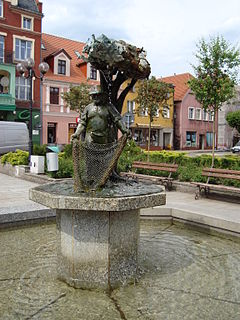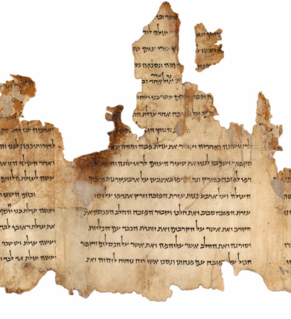
Rabbinic literature, in its broadest sense, can mean the entire spectrum of rabbinic writings throughout Jewish history. However, the term often refers specifically to literature from the Talmudic era, as opposed to medieval and modern rabbinic writing, and thus corresponds with the Hebrew term Sifrut Hazal. This more specific sense of "Rabbinic literature"—referring to the Talmudim, Midrash, and related writings, but hardly ever to later texts—is how the term is generally intended when used in contemporary academic writing. On the other hand, the terms meforshim and parshanim (commentaries/commentators) almost always refer to later, post-Talmudic writers of rabbinic glosses on Biblical and Talmudic texts.

Nathan Birnbaum was an Austrian writer and journalist, Jewish thinker and nationalist. His life had three main phases, representing a progression in his thinking: a Zionist phase ; a Jewish cultural autonomy phase which included the promotion of the Yiddish language; and religious phase when he turned to Orthodox Judaism and became staunchly anti-Zionist.

Aggadah refers to non-legalistic exegetical texts in the classical rabbinic literature of Judaism, particularly as recorded in the Talmud and Midrash. In general, Aggadah is a compendium of rabbinic texts that incorporates folklore, historical anecdotes, moral exhortations, and practical advice in various spheres, from business to medicine.
Leonhard Tietz was born on 3 March 1849 in Birnbaum an der Warthe, Province of Posen, Prussia and died on 14 November 1914). He was a German merchant of Jewish origin.
Tietz is a surname, and may refer to:

Hermann Tietz was a German merchant of Jewish origin. Tietz was born on 29 April 1837, in Birnbaum an der Warthe near Posen and died on 3 May 1907 in Berlin). He was buried in the Weißensee Cemetery.

Lech-Lecha, Lekh-Lekha, or Lech-L'cha is the third weekly Torah portion in the annual Jewish cycle of Torah reading. It constitutes Genesis 12:1–17:27. The parashah tells the stories of God's calling of Abram, Abram's passing off his wife Sarai as his sister, Abram's dividing the land with his nephew Lot, the war between the four kings and the five, the covenant between the pieces, Sarai's tensions with her maid Hagar and Hagar's son Ishmael, and the covenant of circumcision.

Chayei Sarah, Chaye Sarah, or Hayye Sarah is the fifth weekly Torah portion in the annual Jewish cycle of Torah reading. It constitutes Genesis 23:1–25:18. The parashah tells the stories of Abraham's negotiations to purchase a burial place for his wife Sarah and his servant's mission to find a wife for Abraham's son Isaac.

Solomon Buber was a Jewish Galician scholar and editor of Hebrew works. He is especially remembered for his editions of Midrash and other medieval Jewish manuscripts, and for the pioneering research surrounding those texts.

Chukat, Hukath, or Chukkas is the 39th weekly Torah portion in the annual Jewish cycle of Torah reading and the sixth in the Book of Numbers. The parashah sets out the laws of corpse contamination and purification with the water of lustration prepared with the Red Cow. It also reports the deaths of Miriam and Aaron, the failure of Moses at the Waters of Meribah, and the conquest of Arad, the Amorites, and Bashan. The parashah constitutes Numbers 19:1–22:1. The parashah is the shortest weekly Torah portion in the Book of Numbers, and is made up of 4,670 Hebrew letters, 1,245 Hebrew words, and 87 verses, and can occupy about 159 lines in a Torah Scroll.
Oscar Tietz was a Jewish-German businessman (Unternehmer)

The Mekhilta le-Sefer Devarim is a halakic midrash to Deuteronomy from the school of Rabbi Ishmael which is no longer extant. No midrash by this name is mentioned in Talmudic literature, nor do the medieval authors refer to such a work. Although Maimonides says in his introduction to the Yad ha-ḤazaḲah, "R. Ishmael explained from 'we-eleh shemot' to the conclusion of the Torah, that is, the Mekilta," he did not see this midrash, which also includes Deuteronomy, since he does not quote any Mekilta passages to that book of the Pentateuch in his Sefer ha-Miẓwot, although he draws upon the halakic midrashim in discussing most of the commandments. Maimonides probably knew, therefore, merely through an old tradition which he had heard that such a midrash by R. Ishmael existed.

Midrash HaGadol or The Great Midrash was written by Rabbi David Adani of Yemen compilation of aggadic midrashim on the Pentateuch taken from the two Talmuds and earlier Midrashim of Yemenite provenance. In addition, it borrows quotations from the Targums, and Maimonides and Kabbalistic writings, and in this aspect is unique among the various midrashic collections. This important work—the largest of the midrashic collections—came to popular attention only relatively recently through the efforts of Jacob Saphir, Solomon Schecter, and David Zvi Hoffmann. In addition to containing midrashic material that is not found elsewhere, such as the Mekhilta of Rabbi Shimon bar Yochai, the Midrash HaGadol contains what are considered to be more correct versions of previously known Talmudic and Midrashic passages.

Shir ha-Shirim Zutta is a midrash, or, rather, homiletic commentary, on Canticles; referred to in the various Yalḳuṭim and by the ancient Biblical commentators as "Midrash Shir ha-Shirim," or "Agadat Shir ha-Shirim."

Midrash Jonah is the midrash to the Book of Jonah, read on the Day of Atonement as hafṭarah during the Minḥah prayer, and containing a haggadic version of this prophetical book. In the editions the work consists of two parts; the second part, in which the story of Jonah is allegorically referred to the soul, beginning with the words "Wa-yomer Adonai la-dag," is reprinted in Adolf Jellinek, Bet ha-Midrash. This part is merely a literal translation from the Zohar ; it is not found in the version printed by C. M. Horowitz in the Sammlung Kleiner Midraschim. The first part, the midrash proper, is found also in the Yalḳuṭ to Jonah, with the exception of a few missing passages and with several variations; but here the Pirḳe Rabbi Eli'ezer is given as the source.
"It is time to work for the Lord" is the first half of a verse in Psalms that has served as a dramatic slogan at several junctures in rabbinic Judaism.
Hermann Schreiber was a German doctor of philosophy, rabbi and journalist.
Lazar, Grünhut Hungarian rabbi and writer. He is especially renowned for his research & publications in the field of Midrash.












